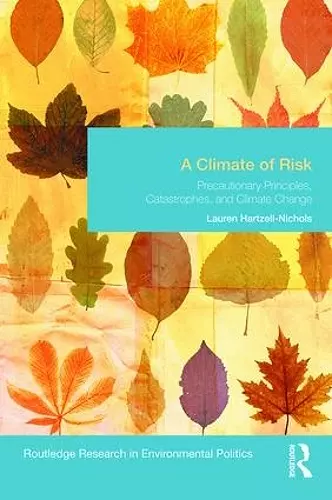A Climate of Risk
Precautionary Principles, Catastrophes, and Climate Change
Lauren Hartzell-Nichols author
Format:Hardback
Publisher:Taylor & Francis Ltd
Published:5th May '17
Currently unavailable, and unfortunately no date known when it will be back
This hardback is available in another edition too:
- Paperback£45.89was £50.99(9780367371760)

We are living in a climate of risk. Our way of life imposes risks on ourselves and others. We are causing climatic changes that have the potential to change radically the conditions under which both we – the present generation – and future generations will live. While we are now quite certain that climate change is happening, we are unsure of exactly what will happen and when, given different emissions and policy scenarios. We are therefore in a position where we must decide what to do about the risks climate change threatens in the face of a range of uncertainties
In this book, Lauren Hartzell-Nichols provides guidance in the face of this uncertainty by offering an in-depth discussion of how and why we ought to take a precautionary approach to climate policy, namely by appeal to a Catastrophic Precautionary Principle and Catastrophic Precautionary Decision-Making Framework. By examining the way in which climate change is harmful, Hartzell-Nichols shows how precaution does have a meaningful role to play in moving climate policy forward if we reconsider what precaution is about before too quickly appealing to precaution as a reason or justification for action.
A Climate of Risk takes a philosophically grounded, interdisciplinary approach that will appeal to a broad scholarly and policy-oriented audience. Hartzell-Nichols’s reinterpretation of the precautionary principle enables precaution to be more effectively leveraged as a driver of action on climate change.
Precaution matters, especially when we may be on the brink of passing tipping points fit to cause catastrophic and irreversible climate change. This book does an admirable job of making the right distinctions in the right places, so as to enable a better understanding of what precaution means in the mess we are in. The distinctive view of precaution defended in the book – in particular, the Catastrophic Precautionary Principle and the Catastrophic Precautionary Decision-Making Framework – moves climate politics forward in novel and much needed ways.Catriona McKinnon, Professor of Political Theory, University of Reading
How can we get a sane grip on the real possibility that extreme climate change will unleash catastrophe? This highly original, widely knowledgeable, and deeply powerful argument shows through a balanced but revealing analysis of the three core approaches of Nordhaus, Stern, and Wagner & Weitzman that the social cost of carbon is being systematically underestimated because of blind-spots in the fundamental assumptions of economics that inevitably mask uncertain dangers of catastrophe that public policy neglects at peril to many generations – a wise and exceptionally important book accessible to non-specialists.Henry Shue, Senior Research Fellow, Centre for International Studies, University of Oxford, and author of Climate Justice
Precaution matters, especially when we may be on the brink of passing tipping points fit to cause catastrophic and irreversible climate change. This book does an admirable job of making the right distinctions in the right places, so as to enable a better understanding of what precaution means in the mess we are in. The distinctive view of precaution defended in the book - in particular, the Catastrophic Precautionary Principle, and the Catastrophic Precautionary Decision-Making Framework - moves climate politics forward in novel and much needed ways. - Catriona McKinnon, Professor of Political Theory, University of Reading
How can we get a sane grip on the real possibility that extreme climate change will unleash catastrophe? This highly original, widely knowledgeable, and deeply powerful argument shows through a balanced but revealing analysis of the three core approaches of Nordhaus, Stern, and Wagner & Weitzman that the social cost of carbon is being systematically underestimated because of blind-spots in the fundamental assumptions of economics that inevitably mask uncertain dangers of catastrophe that public policy neglects at peril to many generations - a wise and exceptionally important book accessible to non-specialists. - Henry Shue, Senior Research Fellow, Centre for International Studies, University of Oxford; and author of Climate Justice
ISBN: 9781138233577
Dimensions: unknown
Weight: 510g
188 pages